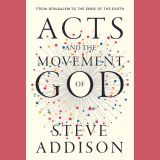Acts and the Movement of God:
An Interview with Author Steve Addison

Why did you write Acts and the Movement of God?
There’s a gap between the movement of God described in the pages of Acts and our experience, especially in the Western world. Luke wrote Acts to help us bridge that gap.
When Jesus rose from the dead, He encountered a band of disciples who were defeated and disillusioned. People just like us. Jesus took 40 days to turn them into a missionary movement that would go to the ends of the earth. He wants to do the same for us today.
What is the book of Acts about?
Acts is more than a book about the early Church. Acts is about God—Father, Son, and Holy Spirit. Luke tells us that what Jesus began to do in His Gospel, He continues to do in Acts through His people (Acts 1:1). God is the main character of the story, and His Word and Spirit are the driving force propelling that story forward. Angels appear, prophets speak, prison doors open, houses shake, thousands believe, persecutors fall to the ground, the Scriptures are fulfilled—God directs this mission. He calls His people into what He is doing.
What’s God’s agenda in Acts?
The Father’s plan is centered upon His Son, whose obedience to death brought forgiveness of sins and a restored relationship with Him. Now risen and enthroned, the Lord Jesus rules through the Spirit, who empowers the disciples to proclaim this salvation to every people and every place. At Pentecost, the outpouring of the Spirit reached its climax in the proclamation of the Word to the nations and the formation of the Church in Jerusalem. As the Word goes out, the Spirit forms those who repent and believe into the new people of God who are witnesses to the ends of the earth.
We live in a very different world. Is Acts still relevant?
There’s no other book like Acts. It ties together the coming of Jesus and His continuing mission through His Spirit-empowered disciples. Acts is a book about the unchanging God. Its relevance cannot be confined to the past.
The church in every generation must return to the book of Acts and find renewal in its identity and mission or else risk settling down.
You went looking for examples of the patterns of Acts lived out today. What did you find?
I found examples on every continent.
There’s a movement of disciples and churches in the red-light district of Mumbai, India. Every year, thousands of mostly Nepali women and girls are trafficked and forced to work as prostitutes. In the past four years, 300 women have been rescued from slavery by the Hilltop of Hope ministry. One hundred of them have been baptized and are following Jesus in simple churches. The churches are islands of hope, offering a community that accepts them and opens the door to a new way of life.
In the Middle East, two local workers were out praying for needs in a neighborhood controlled by Islamic militants. A man was healed and turned to Christ. Immediately, he started sharing his faith with friends and relatives. He met fierce persecution and had to flee, but everywhere he goes, he leaves behind small bands of new disciples gathering as churches.
What about in the Western world?
In London’s financial district, teams are heading out during their lunch break offering prayer and engaging people with the Gospel. About 200 people have come to faith. They meet for discipleship over coffee or lunch and workplace churches are forming and spreading from the city to the suburbs and to other global cities.
There are other examples in the book of movements emerging in Britain, Canada, and the United States.
How were you surprised by Acts?
In Acts, I was surprised how simple and concrete the mission of God is. Acts is all about the spread of God’s Word through the disciples, empowered by the Holy Spirit. The messengers are hard pressed, but the Word never takes a backward step. As the Word spreads, grows, and multiplies, the outcome is always new disciples and churches to the glory of God—every people, every place.
You see this on the day of Pentecost. The Spirit comes in power upon every disciple. The Word goes out and the fruit is disciples meeting across the city. Pentecost is not just the birth of a church but the birth of a missionary movement that is headed for the ends of the earth.
Why aren’t we heeding the lessons of Acts?
We all know there’s a gap between the movement of God in Acts and our experience. Facing that gap is uncomfortable; it implies radical change in our behavior. So we tell ourselves Acts doesn’t apply today. Our world is different. The tension is eased. We measure ourselves with ourselves and refuse to look into the mirror of God’s Word.
Acts was written to show us how God fulfills His mission in the world and how we are to play our part. We need to be disturbed about the gap between what we read in Acts and our current experience. Despair is a virtue if it drives us to the suffciency of God. He wants to inspire us to believe that what He did in Acts, He can do today. Around the world, it’s already happening.
|









comments